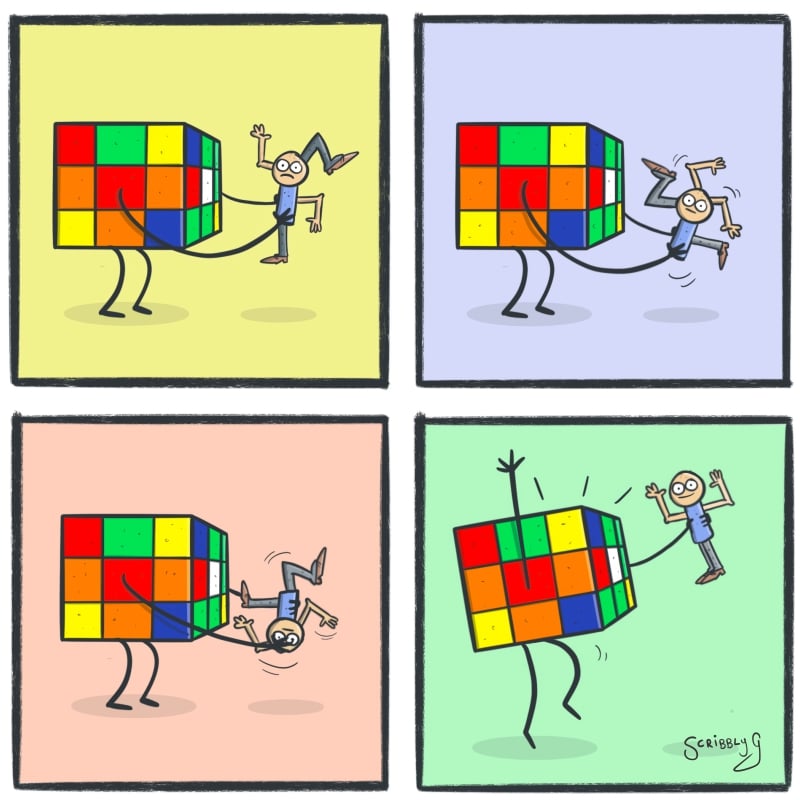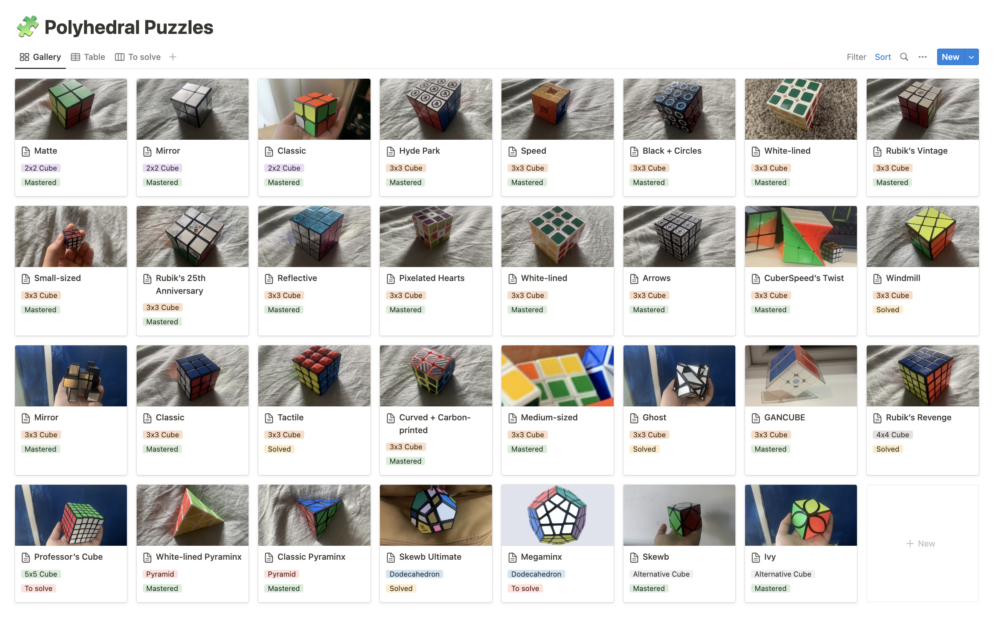
existential cubes by Kanokwan T. '26
a daily encounter with Ernő Rubik
Every day, a cube awaits.
one decade ago
Summer boredom loomed, then curiosity got the best of us. On one sweltering day, my oldest brother and I scootered over to Walmart with one goal in mind: acquire a Rubik’s cube. We had nothing else planned for the day, and decided to try something new. Intently following the instruction manual together, like building IKEA furniture, we eventually solved our first cube together. Yippee! It wasn’t as hard as we made it out to be in our heads—we just patiently followed the book. “If the cube problem looks like this, here is the next step.” Man, if only life were always this easy.

a love letter to polyhedral puzzles / a morning tendency
Solving puzzles like these is one of the few activities that has stuck with me, like an itch that I just can’t shake. Polyhedral puzzles are beautiful both aesthetically and mathematically—visually simple yet mentally rigorous. There’s immediate satisfaction. The goal is straightforward. I can take it anywhere with me. Virtually every problem is new and different. There’s so many types of puzzles, ranging in shape, color, and movement. Pretty artwork and messages can be configured on them. Other people can scramble the puzzles for me. I can do it for a minute or for hours on end. I can hold the puzzles, and sometimes I admittedly hug them. I can’t help myself—they’re just so cute! And above all, it’s fun.
Over the years, I’ve loosely played with these puzzles off-and-on, meaning I picked them up whenever a random urge would hit. Only this past spring did I find myself incorporating them into my daily regimen. I don’t know what got into me, really—it just naturally came upon me. Gradually, every day, I found myself starting my day with the same thing.
Every morning, the first thing I do right after I wake up is solve a Rubik’s cube.
averting morning brain drain
This routine has been especially helpful for getting me out of bed, among other things that the cube gets me through in life. Sometimes, the morning can feel like such a drag, as if the entire world were jello and it’s a slog to move through any of it. So, in the eyes of someone who has just woken up, the combined ease of a cube being an arm swing away and gratification of a solve makes it an approachable, achievable goal. This helps me stay off my phone in the morning, too. I sought an activity to replace the stimulation that my brain likes from perusing the internet01 and possibly getting sucked in for hours via the Dangerously Entertaining Forces of Scrolling with something that was offline, which brought me to the cube. It helps set the tone for the rest of the day. Like, before I’ve even gotten out of bed, I’ve already achieved something. Something about solving a tiny problem, in some way, makes me feel like I can solve big ones too.
“it’s the little things”
It seems silly, but I’ve found that the cube gives me something to look forward to every day. I think that’s important. In fact, the “small” joys can feel even more central in my life than the “big” joys because they shape my daily life. I may not ride roller coasters every day, but I do solve my little cube. I enjoy the pillowy softness of my lotion when I apply it after a shower. I love the bittersweet mellowness of matcha in the morning. I like walking through my neighborhood and passing by this one tree with a tire swing hung from it. There’s so much to love, even in the simple things. So, I try not to let the little moments of delight slip by. Every day, I do my best to squeeze as much joy as I can out of this sponge called life.
on habits
Two quotes come to mind:
- “How we spend our days is, of course, how we spend our lives.” —Annie Dillard
- “We are what we repeatedly do. Excellence, then, is not an act, but a habit.” —Will Durant 02 derived from Aristotle's Nicomachean Ethics, which I read in CC.110 Becoming Human, a philosophy course I had to take in my freshman year because I was in the Concourse program
I think the act of maintaining a habit ultimately comes down to perpetually caring about your future self. Like, will brushing my teeth right now do that much for present-me? No, not really. My teeth feel about the same. But, will future-Kano be thankful for having healthy teeth because present-Kano brushed every day? Of course. With regard to the cube, I know I’ll be grateful for always trying to start off my day well.
Also, noticing my relationship with habits has helped me better understand how I feel. I’ve noticed that when I start to neglect the small things, the big things seem to unravel. Some specific cues that I’ve noticed include neglecting to brush my teeth, leaving the dishes overnight, and not watering my plants. They’re little checks to keep myself out of delusion. Specifically, there are times when I’ve convinced myself that I’m doing okay when I’m really not. The thoughts in my head may say one thing, but my actions say another, and I trust the actions.
Albeit, I do admit that habits can feel strangely… confining? Like, ah yes, I am putting myself in habit jail for the rest of my life. But, I think that can be reframed as “I’m giving myself things to look forward to,” whether that be a nourished appetite, healthier skin, or simply happily getting out of bed in the mornings. And, of course, things change: the habits you live by can and will evolve with you. On the topic of reframing, I also think not being 100% on top of habits all of the time is perfectly okay. It’s natural. Instead of dwelling on a missed day, I try my best to remind myself that these moments are normal, accept that it has happened, and try to do better the next day.
So, yeah, most days I solve the cube. Some days, I don’t. And that’s okay. I just make my effort every day, for that’s all I can do.
nihilistic cubes / gamification of life
The Rubik’s cube feels like a good metaphor for life. Why scramble it? Why solve it? All to come back to the same place in the end?
These questions remind me that I have a choice. I choose to play with cubes because I want to. I find it fun. I like the journey of the game, despite the ultimate perpetuity of making it through. John Green elaborates on this well in one of his vlogs, where he said “I work when I feel hope, when I am able, as F. Scott Fitzgerald once put it “to hold in balance the sense of the futility of effort and the sense of the necessity to struggle.” Ultimately I believe that effort is never futile so long as there are people to share in that effort and people who might benefit from it. In the grand scheme of things, maybe nothing will matter, but we don’t live in the grand scheme of things—we live here in the day-to-day.”
mit and the cube
I would be remiss not to acknowledge MIT’s relationship with the Rubik’s cube. Yes, there’s a decent cubing scene. Our club hasn’t been active for a hot minute, 03 although, there have been efforts in the past year to revive it but there are cute, small pockets of cubers around campus. Yes, we hold the world record for fastest solve time by a robot. Yes, the cube is scattered in bits all around the website. I do feel funny clarifying this, but if it wasn’t already clear, not everyone knows how to solve a Rubik’s cube, and nobody needs to. In fact, I’m pretty sure that most people I know at school don’t play with cubes. It’s just a fun thing some people do.
my collection
I feel like a polygonal mother. These are my precious children. <3

I simply love them. They’re my little playthings, always there to elicit some joy. This summer, I’m learning the 4×4 and 5×5, with around a month left to go before the fall term begins. Wish me luck!
I hope you have found or will find your “cube,” something that brightens your day—even in the slightest of ways. It makes all the difference.
Every night, the last thing I do right before bed is scramble my Rubik’s cube.
- and possibly getting sucked in for hours via the Dangerously Entertaining Forces of Scrolling back to text ↑
- derived from Aristotle's Nicomachean Ethics, which I read in CC.110 Becoming Human, a philosophy course I had to take in my freshman year because I was in the Concourse program back to text ↑
- although, there have been efforts in the past year to revive it back to text ↑